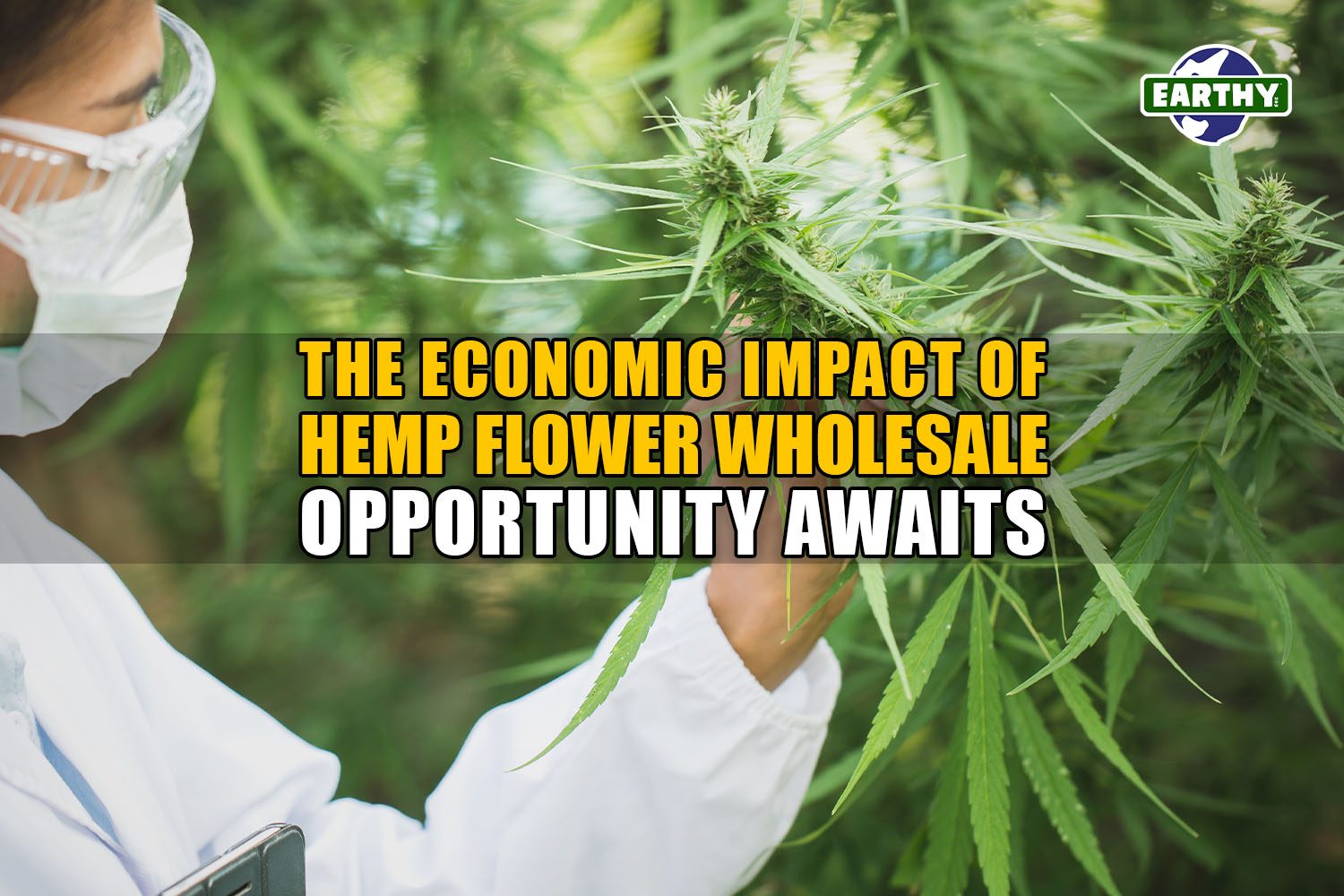In the contemporary landscape of agriculture and commerce, the economic ripple effects of hemp flower are increasingly apparent. Indeed, this versatile plant, derived from the cannabis species, is gaining traction across various industries, including textiles, biofuels, and personal care [1]. As the market for hemp products expands, understanding its economic implications becomes imperative. This article delves into this multifaceted realm of the hemp flower economy. We’ll explore the economic impact of hemp flower on job creation, technological innovation, environmental sustainability, and more.
Global market trends in hemp flower wholesale
The global economic impact of hemp flower is currently surging, propelled by evolving consumer preferences and legislative changes. Notably, countries worldwide have begun to revise regulations surrounding industrial hemp cultivation and distribution. Thus, the barriers to entering this market have diminished, paving the way for increased economic opportunities. From North America to Europe and beyond, the industrial hemp and hemp flower markets have witnessed unprecedented growth, catering to diverse industries and consumer demographics [2].
The economic impact of hemp flower in rural development and agriculture
Hemp cultivation emerges as a transformative force in rural economies, offering farmers a lucrative alternative to conventional crops. For example, growing hemp means a rapid growth cycle, minimal need for pesticides, and the ability to thrive in various climates. Thus, hemp presents an attractive proposition for agricultural innovation. For instance, communities grappling with economic downturns may find renewed hope through hemp farming, tapping into domestic and global markets for hemp-derived products. Potential hemp revenues might come from hemp-derived textiles, construction materials, food, wellness products, or biofuels [3].
Unlocking the Potential of Hemp Flower Wholesale with Earthy Now: A Comprehensive Guide
Supply chain dynamics and their economic impacts
Efficient supply chain management is paramount for the success of the growing industrial hemp and flower industry. For example, a robust supply chain demands efficient cultivation, processing, and wholesale distribution. Businesses can enhance their competitiveness and profitability by optimizing processes and reducing overhead costs. Furthermore, an efficient supply chain infrastructure facilitates the seamless movement of hemp products across state lines, tapping into diverse markets and consumer bases [4].
Reputable wholesale suppliers like Earthy Now ensure efficient supply chain processes for businesses. From the cultivation of popular cannabis plant strains by American farmers to the delivery of high-quality hemp flower, Earthy Now has businesses covered.
Investment opportunities in the hemp flower industry
The burgeoning hemp flower industry presents many investment opportunities for discerning stakeholders. There is a growing interest in funding various aspects of the hemp economy, from venture capital firms to individual investors. Whether investing in cultivation facilities to grow hemp, processing plants, retail outlets, or technological innovations, stakeholders stand to reap substantial returns in a market poised for exponential growth [5].
The Future of Hemp Flower Wholesale: Predictions and Trends
Earthy Now: leading the way in wholesale hemp flower
Earthy Now stands out as a trailblazer in the wholesale hemp flower market. Offering a comprehensive range of high-quality products and unparalleled support for businesses, Earthy Now is a solid partner. As a trusted supplier, Earthy Now understands the significance of quality, competitive pricing, and compliance in today’s evolving landscape.
Notably, Earthy Now’s commitment to excellence starts with the hemp plant itself. Their team ensures that hemp production meets the highest standards through meticulous cultivation practices and rigorous quality control measures. As a result, their team offers premium-grade hemp flower and hemp-derived products. Moreover, they promote economic and environmental sustainability by prioritizing sustainable growing methods that use fewer chemicals.
Cannabis Cigarettes versus Traditional Smoking
Earthy Now’s wholesale program
In an ever-expanding cannabis industry, Earthy Now remains at the forefront, providing wholesale partners with valuable market research insights and regulatory guidance. For example, their team of experts keeps abreast of the latest trends, regulations, and consumer preferences. This information empowers businesses to make informed decisions to capitalize on emerging opportunities. Moreover, Earthy Now’s unwavering commitment to compliance with the federal government ensures wholesale partners can seamlessly navigate domestic markets. Additionally, this support helps buyers mitigate risks and maximize profitability.
Earthy Now’s diverse catalog includes loose hemp flower, oils, gummies, and extracts, catering to a wide range of consumer needs while adhering to low THC levels. Whether businesses produce CBD oil-infused products or incorporate Earthy Now’s popular products into their inventory, their team provides cost-efficient solutions. As a result, a wholesale partnership with Earthy Now drives success in today’s competitive market environment.
Why Earthy Now Stands Out in the CBD Flower Wholesale Market
Economic impact of hemp flower on job creation
The hemp flower industry catalyzes job creation across multiple sectors, from agriculture to manufacturing, distribution, and retail. As demand for hemp products escalates, so does the need for skilled workers to meet the production and logistical requirements of the hemp industry. For example, jobs like agricultural technicians, processing specialists, marketing professionals, and retail associates attract candidates eager to participate in this exciting industry [6].
With the passage of the 2018 Farm Bill and the growing popularity of the CBD market in recent years, Earthy Now is poised to meet the increasing demand.
Technological innovations and their economic contributions
Technological advancements play a pivotal role in shaping the trajectory of the hemp flower industry. From precision farming techniques to automated processing machinery, innovation drives industrial hemp products’ efficiency, productivity, and cost-effectiveness. Embracing these advancements enables businesses to stay competitive in a rapidly evolving market landscape. Additionally, it helps companies make the most of emerging trends [7].
Some technological advances in the hemp industry include:
- Innovations in hemp processing machinery for producing building materials such as hempcrete, an eco-friendly alternative to traditional construction materials [7].
- Controlled environment agriculture (CEA) technologies for indoor hemp cultivation allow farmers to optimize growing conditions and maximize yields [7].
- Bioremediation techniques leverage hemp’s ability to absorb toxins from soil, facilitating the cleanup of contaminated land and promoting sustainability [8].
- Developing hemp-based textiles as alternatives to conventional materials like cotton reduces the environmental impact of clothing production [9].
- Implementing blockchain technology for supply chain transparency and traceability ensures compliance with regulations such as the Controlled Substances Act [10].
- Integrating hemp biomass into biofuel production offers a renewable and sustainable energy source.
- Using hemp-derived materials to produce recyclable products contributes to the circular economy and reduces waste [11].
- Genetic engineering and breeding advancements develop hemp varieties with improved traits for specific industrial purposes, such as fiber strength and oil content [12].
Challenges and barriers to market entry
While the prospects for hemp flower is promising, businesses encounter various challenges when entering the market. Regulatory complexities, market saturation, logistical constraints, and capital requirements pose significant hurdles to newcomers. However, strategic planning, market research, and collaboration with industry partners can mitigate these challenges. For example, partnering with a trustworthy supplier like Earhty Now can pave the way for success in the dynamic hemp flower wholesale market.
Emerging Trends in the CBD Market: Insights for Wholesale Buyers
The environmental impact and sustainability of hemp cultivation
Beyond its economic potential, hemp cultivation offers compelling environmental benefits, positioning it as a sustainable alternative to traditional crops. For example, hemp’s deep root system helps mitigate soil erosion from the crop. Additionally, the plant’s fast growth and minimal need for pesticides promote biodiversity and ecosystem health. As an added benefit, sustainable hemp cultivation facilitates water conservation and carbon sequestration, contributing to efforts to mitigate the effects of climate change [13].
How Much Cannabis Will Increase Libido?
Future prospects: scaling the hemp flower market for economic growth
Looking ahead, the future of the hemp flower market is brimming with promise, offering untapped potential for economic growth and prosperity. As regulatory frameworks continue to evolve and consumer awareness expands, the demand for hemp products is poised to soar. By leveraging technological innovations, fostering strategic partnerships, and prioritizing sustainability, stakeholders can position themselves at the forefront of this burgeoning industry.
Earthy Now is a key player in driving this economic growth and environmental stewardship. Businesses interested in forming partnerships with Earthy Now can be a part of the tremendous economic impact of hemp flower and the booming cannabis industry. Contact Earthy Now today and share in the success.
How to Choose the Right Wholesale CBD Flower Supplier
Medical Disclaimer / Legal Disclaimer – Information is provided for educational purposes. It does not and is not intended to constitute legal advice or medical advice. We attempt to be accurate and up-to-date, but the legality of cannabinoids and the science of cannabis are evolving. The author is neither a legal professional nor a medical expert. Before buying or using any products, you should check with your local authorities and medical providers.
References
- Hemp’s Potential Across Various Industries
- Industrial Hemp Market Size and Trends
- Hemp Cultivation: What Are the Benefits to the US Economy?
- Cracking the Code to the Industrial Hemp Supply Chain
- Is Hemp the Next Big Thing in Investment?
- How Has the Hemp Industry Created Jobs in America?
- 10 Innovative Technologies in the Hemp Industry
- Can Hemp Clean Up the Earth?
- Hemp: The Super Fiber
- How Blockchain Technology Can Revolutionize Hemp Supply Chain Issues
- What Can You Do with Hemp Biomass?
- Hemp Genome Editing
- Regenerative Agriculture and the Power of Hemp





